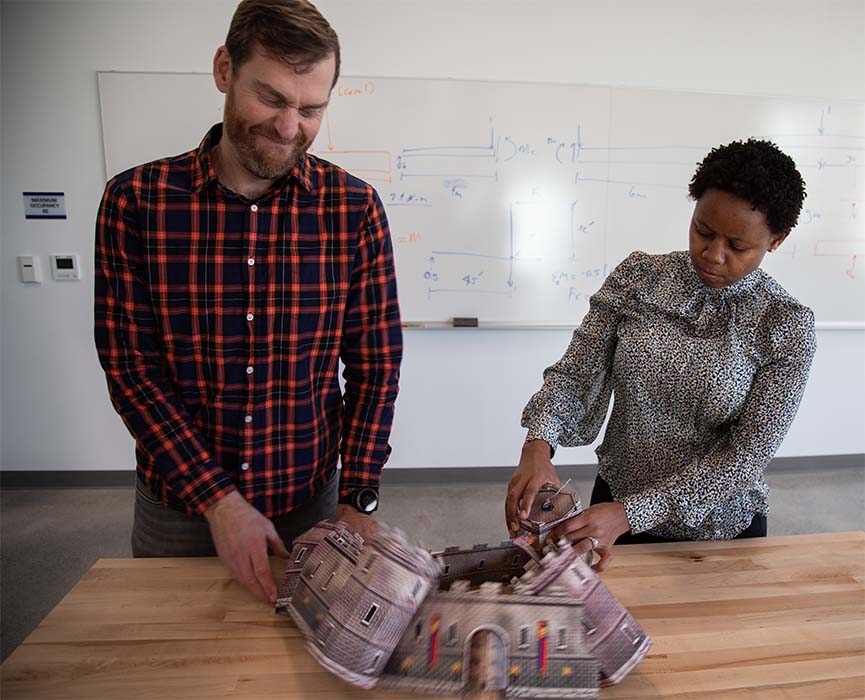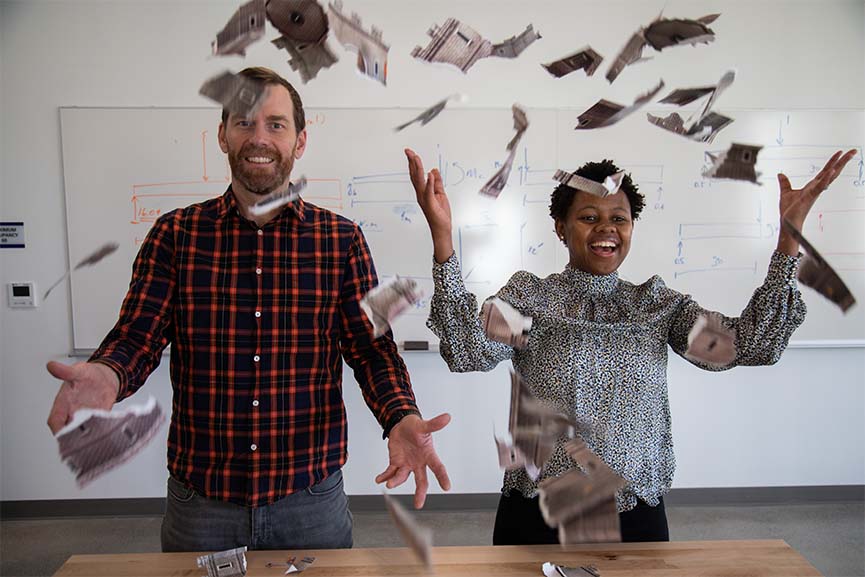
Breaking Down Engineering Barriers
A project called “Research for All” aims to get students involved in hands-on engineering research as an integral part of their classroom experience.
“Research for All.”
The name conjures images of “The Three Musketeers,” their rapiers clanging together in celebration as they shout, “All for one and one for all!” In this case, swap the rapiers for engineering squares and replace 17th century swashbucklers with modern day students.
“Research for All” is the name of a three-year, multi-institution project to broaden access to undergraduate engineering research experiences. The project and Alexander Dumas’ French historical novel have little in common. However, the name “Research for All” does inspire the same kind of visceral feeling as the Musketeers' famous mantra.
“The goal of this project is to streamline and increase access to undergraduate research experiences through a number of different avenues,” said School of Engineering & Technology Assistant Professor Jeff Walters, who is the principal investigator on the UW Tacoma portion of the project.
Walters is working with a team of collaborators at seven other engineering institutions across the U.S. Besides UW Tacoma, the others are George Washington University in Washington, D.C., George Fox University in Oregon, North Carolina Agricultural and Technical State University, Olin College of Engineering in Massachusetts, University of North Carolina at Chapel Hill, Campbell University in North Carolina and Valparaiso University in Indiana.
The diversity of engineers should reflect the diversity of society.
“Research for All” has three broad themes: You are Curious, You are Connected and You are Skilled.
The You are Connected team is creating an online platform to connect faculty and students to research projects. You are Skilled will provide training modules for students to learn new skills. “For example, a student could take a module on how to use a 3D printer,” said Walters.
For his part, Walters is primarily focused on the You are Curious portion of the project. “This is all about integrating research into classes that students have to take,” said Walters. “It’s called course-based undergraduate research or CURE.”
The CURE concept has been around for a while, but not quite like this. “As part of this project we did a literature review to see how this idea has been applied in the natural sciences as well as biology and chemistry,” said Walters. “We found 258 studies but nothing in engineering. This is a great opportunity for engineering education. What we’re attempting hasn’t been done before.”

CURE for Micromobility
Walters will have some help rolling out CUREs in engineering courses at UW Tacoma. “Each year for three years we will have two new faculty in the School of Engineering & Technology that will implement CUREs into their classrooms,” he said.
In the summer of 2022, Walters onboarded Associate Teaching Professor Chris Marriott and Assistant Professor Angela Kitali. “Chris is planning his CURE for spring or summer, while Angela did hers in the fall,” said Walters.
Kitali is a trained civil engineer whose research interest is highways, particularly highway safety. Kitali developed a CURE as part of her transportation engineering course. “The focus of this project was in trying to understand micromobility in Tacoma,” she said. Micromobility refers to things like bicycles, skateboards and scooters. “I had students focus specifically on scooters to see if they could complement public transit,” said Kitali.
Students were divided into three groups. “One group focused on safety, while another looked at usage patterns in terms of time of day, season and weather conditions and the final group examined the relationship between scooter usage and the spike in gas prices,” said Kitali.
Kitali provided students with some data, but not all of it. “They had to reach out and connect with people at the City of Tacoma and at Razor,” she said, referring to the private company that contracts with Tacoma to offer micromobility services. Students not only collected the data, they also analyzed it. “They learned, for instance, that most of the scooter trips in our area are for leisure and happen mostly on weekends and during the summer,” said Kitali. “The group looking at scooter use and gas prices collected data from Tacoma as well as other cities. They found that scooter use increased as gas prices increased, but there was no clear conclusion that showed one caused the other.”
Grand Challenges
This isn’t just research for the sake of research. “We are facing issues in transportation in terms of climate change and congestion,” said Kitali. “The work my students did identifies a problem and looks for potential solutions.”
Walters agrees. “These CUREs specifically target grand challenges, ones that have an impact on society,” he said.
Kitali’s CURE is the first at UW Tacoma as part of “Research for All,” but it won’t be the last. “I’m going to apply CUREs to three of my classes, but they will be applied to at least six other classes at UW Tacoma,” said Walters. “Let’s say we have nine classes with twenty students in each, that’s almost two hundred students who will come away with research experience — and that’s just from this institution, all eight partner institutions involved in this project are doing something similar.”
For Walters, it doesn’t matter if students who get this experience actually want to do research as part of their careers. “Engineering research helps students become more curious and creative,” he said. There’s another benefit. “Students can put this on a resume. They can engage with research in the classroom. This is especially important for students who come from historically marginalized communities and haven’t had the same kind of access.”




